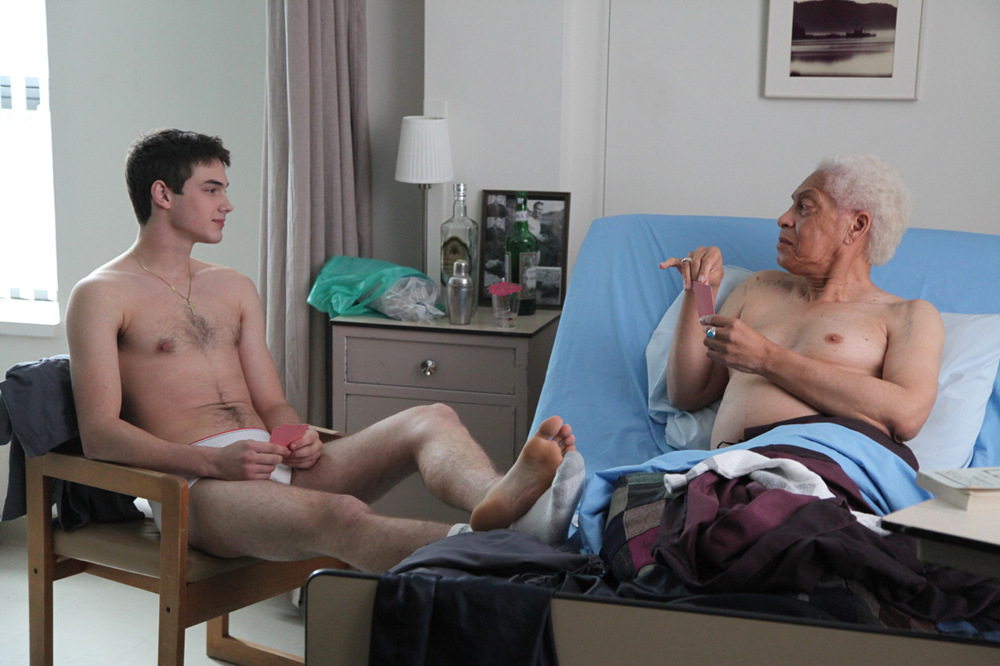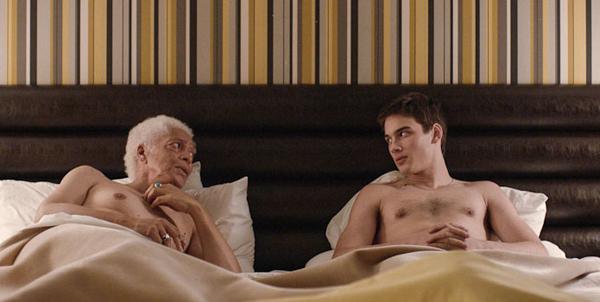Queer provocateur Bruce LaBruce reminds us age ain’t nothing but a number in ‘Gerontophilia’
Auteur: Michael-Oliver Harding
A tender, intergenerational gay love story about an 18-year-old Montreal skater boy (Pier-Gabriel Lajoie) and an octogenarian living in a nursing home (Walter Borden), inspired by age-ain’t-nothing-but-a-number classics like Harold and Maude and Lolita? When I first heard about Canadian queercore bad boy Bruce LaBruce’s latest feature, I wondered if this could oddly be his most subversive film yet. From gory, gay zombie porn (Otto; or Up with Dead People, L.A. Zombie) to neo-Nazi skinhead fetishizing (Skin Flick, No Skin Off My Ass), no social taboo or sexual proclivity has ever been off-limits to LaBruce. For the last two decades, this loose cinematic cannon has shaken up the often stale, cookie-cutter LGBT film genre, carving out a distinctive niche with his twisted use of
camp, his B-movie aesthetic and his horned-up queer characters living on the fringes. To give you a sense of his cult-like acclaim, grunge icon Kurt Cobain famously declared LaBruce’s No Skin Off My Ass his favourite film.
Now, after chronicling Santa Monica Boulevard hustlerdom and urging audiences to “join the homosexual intifada,” Gerontophilia finds the famous provocateur embarking on an altogether new chapter. Sure, the film may be about a young twink who beats off to his Gandhi poster and gets a hard-on giving elderly guys sponge baths or mouth-to-mouth resuscitation, but it’s also LaBruce’s biggest budget feature yet (shot with a union crew and government grants) and his first non-sexually explicit project. While Gerontophilia’s casting is uneven at best (the excellent Borden is really in a league of his own) and most supporting parts unfortunately never rise above the clichéd, the film nevertheless makes for an interesting conversation starter about the mysterious nature of sexual fetishes and the complications of desire. Nightlife.ca spoke with LaBruce, who won the Festival du nouveau cinéma’s Grand Prix Focus last fall for Gerontophilia, about the mainstreaming of gay culture, direct action activism and the limitations to advocating we're all just “born this way.”
Before premiering Gerontophilia in Venice and Toronto, were you apprehensive about your fans' reaction to this change in direction? Did you regard the project as a risk?
For me, Gerontophilia was a risk in reverse trajectory, something unlike what you’d expect from me. It’s not pornographic, it’s romantic – so I was a bit apprehensive about that. But I found that my hardcore fans weren’t put off by that, they found that it was still true to my work thematically, the spirit of it. That fear of mine was kind of dispensed with. Walter Borden and Pier-Gabriel Lajoie in Gerontophilia
Walter Borden and Pier-Gabriel Lajoie in Gerontophilia
Gerontophilia is transgressive in subtle ways. Lake is a straight guy with a girlfriend and yet he develops an intimate sexual relationship with an old man. Would you say you’ve always been interested in exploring characters who don’t identify with society’s sexual pigeonholing?
Absolutely. it’s consistent with the way I portray homosexuality in my work. The main character is straight. He’s not gay identified, he has a girlfriend, he happens to have a sexual fetish for the elderly and it’s largely expressed because he’s working in an all-male nursing home. Whether he’s gay or will become in the future is a good question. But my films have always been about people who have homosexual sex but don’t necessarily identify as gay. I’ve dealt with male prostitutes, neo-Nazi skinheads, left-wing revolutionary ideologues, zombies – characters who are often disenfranchised by the gay community. That’s the whole point: I’ve never felt like I totally fit in with the gay community myself. I question identity politics and am against this “born this way” attitude which I think is very essentialist and discourages people who might have bisexual impulses from exploring their homosexuality.
You’ve always operated on the margins of queer cinema – you’re a hero to those who’d like queer identity to remain more radical and underground, while you’re dismissed by some who fight for more mainstream acceptance. How have you negotiated that relationship over time?
I think you have to make a distinction between queer cinema and mainstream gay cinema. I think a lot of queer cinema is about challenging the gay orthodoxy and its identity politics. When I started out doing short films and fanzines in the ‘80s, even then, my friends and I were disillusioned with the orthodox gay community. We thought it was too assimilationist, corporate and bourgeois – and that was in the ‘80s! So you can imagine, 25 years later, how dismaying it is to see just how much the entire culture has moved towards the right. I try to keep up my fight against it. For me, homosexuality has always been about having an opportunity to express your difference, and to question authority, orthodoxy, to fight against oppressive mainstream institutions.
I want to touch upon an article written last fall that equated your opposition to a Sotchi Olympics boycott with you somehow losing your edge, which I felt misrepresented your stance on gay rights issues. As someone who has presented his very explicit gay work in Russia, what were you actually suggesting?
Basically, I just don’t think boycotts are the way to go. I think it should be about direct action – to actually show your gay-themed work in countries that are homophobic. Like in Russia, face the homophobia head-on through activism. Over the years, I’ve shown my films in very dodgy places for homosexual work. When I showed my films in Zagreb eight years ago, I had a police escort to every screening. I showed L.A. Zombie in Moscow two years ago at a fest called the Tomorrow Festival, where we held a press conference calling for more gay visible work, supporting homosexual work in Russia.
Gerontophilia
Now in theatres











